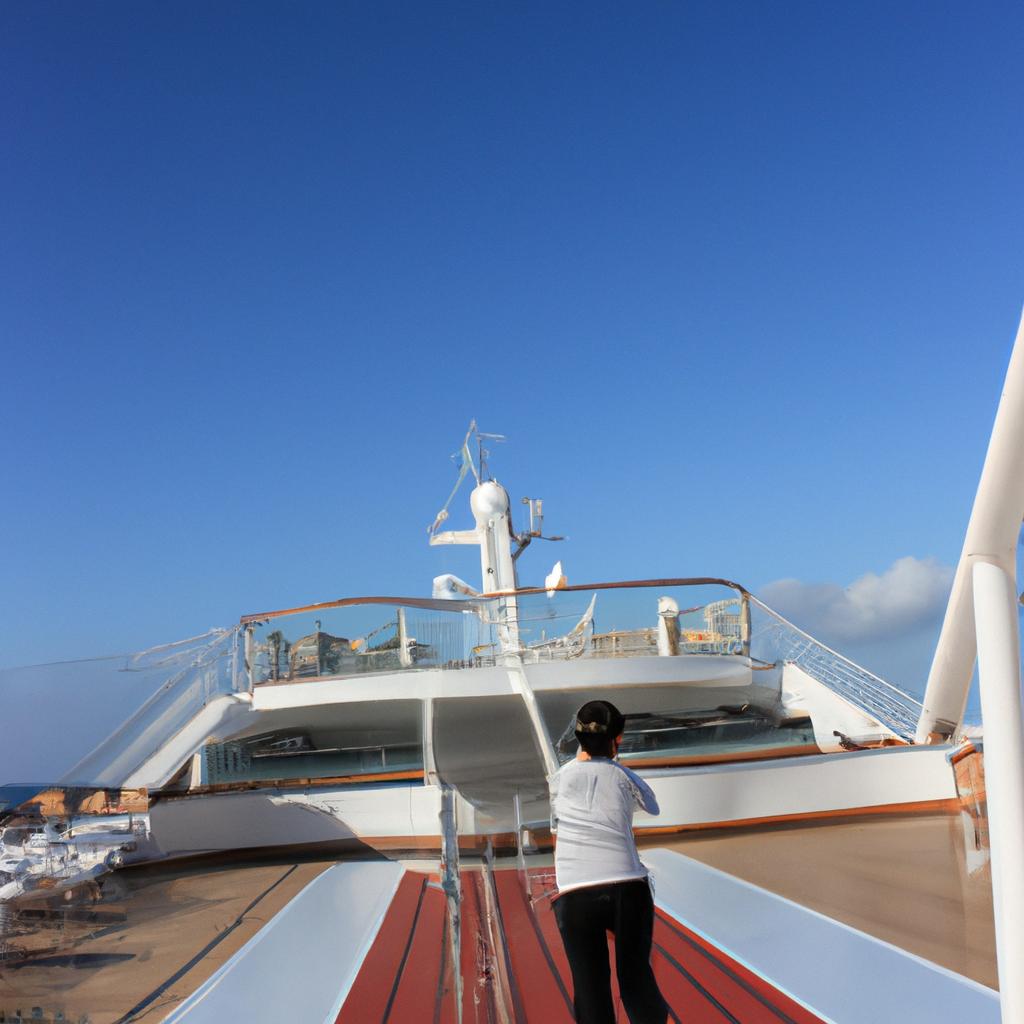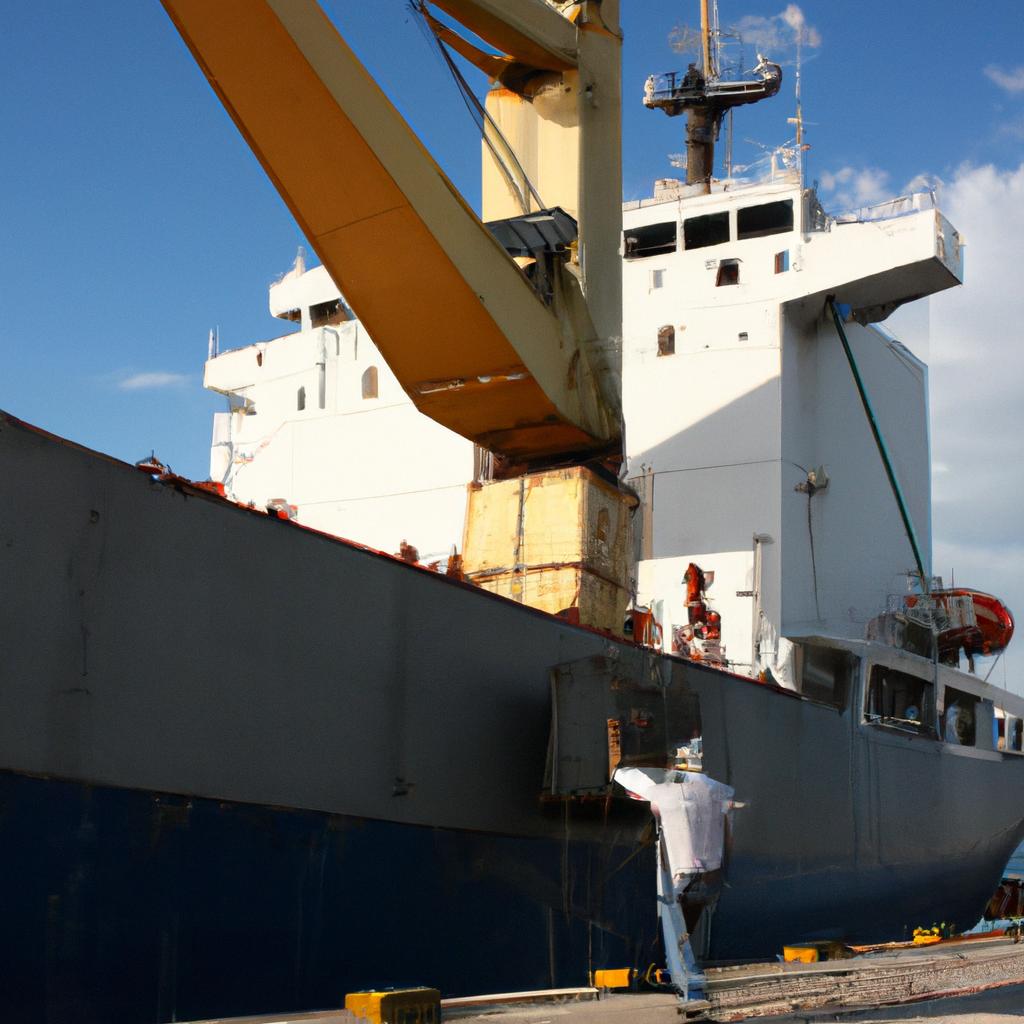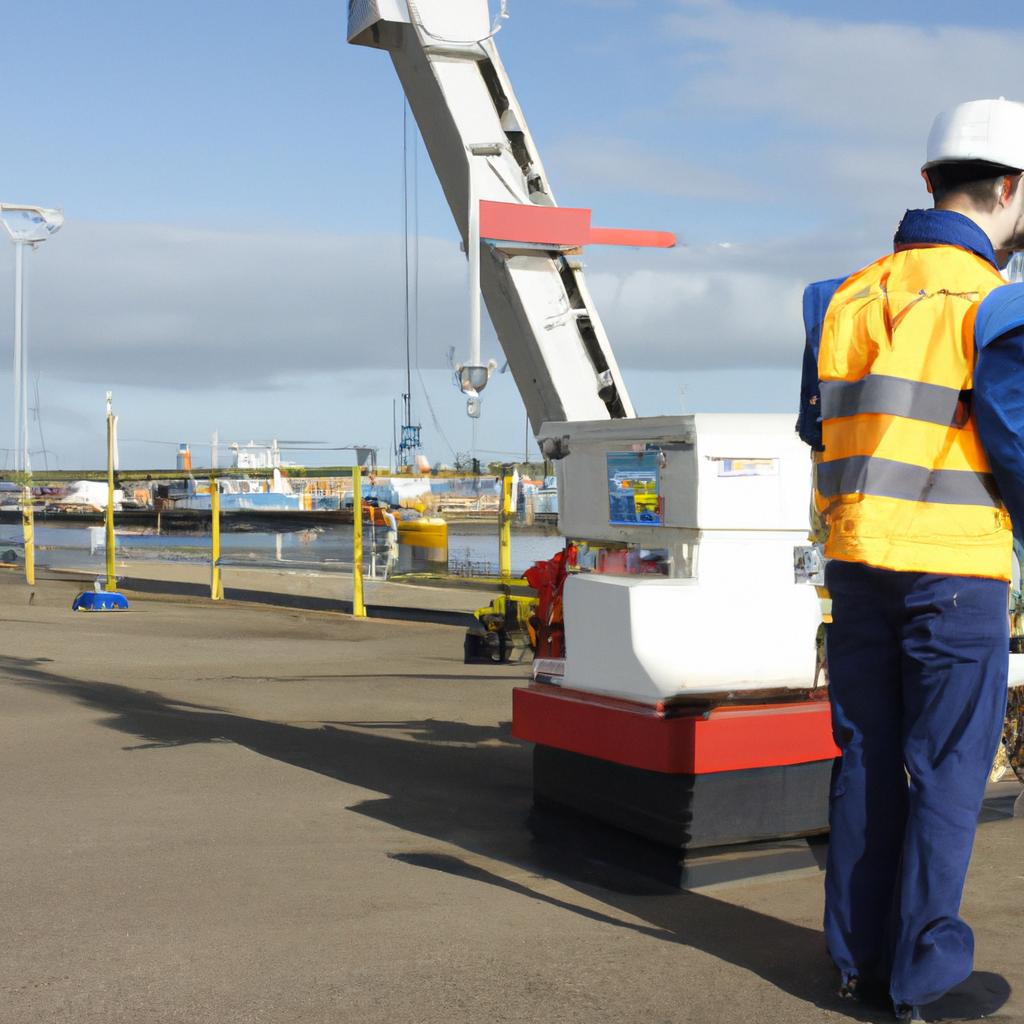Ferry services play a crucial role in facilitating transportation and trade across various bodies of water, including the Black Sea. The Black Sea, located between Eastern Europe and Western Asia, has long been an important trade route connecting different regions and cultures. This article aims to explore the diverse ferry services available in the Black Sea region, focusing on their significance for transport and highlighting specific routes that have contributed to regional connectivity.
To illustrate the importance of ferry services in the Black Sea region, we can consider the case study of the Istanbul-Odessa route. This particular sailing route connects two major cities situated on opposite sides of the sea – Istanbul in Turkey and Odessa in Ukraine. The implementation of this ferry service has not only enhanced tourism opportunities but also fostered economic growth by facilitating trade between these two countries. By examining such examples, we gain insights into how ferry services contribute to regional development and integration within the Black Sea area.
In order to comprehend the full scope of ferry services operating within the Black Sea region, it is essential to examine both historical aspects as well as current trends. By exploring factors such as infrastructure developments, regulatory frameworks, and market demand, this article seeks to provide a comprehensive overview of black sea transport sailing routes. Such knowledge will enable policymakers, such knowledge will enable policymakers, business owners, and individuals to make informed decisions regarding their transportation needs in the Black Sea region. They can identify potential opportunities for investment, assess the feasibility of new ferry routes, and understand the impact of existing services on regional connectivity and economic growth.
Additionally, understanding the significance of ferry services in the Black Sea region allows for better coordination and collaboration among stakeholders involved in transportation and trade. This includes port authorities, shipping companies, tourism boards, and government agencies responsible for regulating maritime activities. By recognizing the importance of ferry services as a vital link between different regions within the Black Sea area, these stakeholders can work together to improve infrastructure, streamline logistics processes, and enhance overall efficiency in maritime operations.
Furthermore, by studying specific ferry routes and their contributions to regional connectivity, we can gain valuable insights into the social and cultural aspects of the Black Sea region. Ferry services not only facilitate trade but also enable people from different countries and backgrounds to interact with each other. This promotes cultural exchange, tourism development, and a deeper understanding of shared histories among Black Sea communities.
In conclusion, ferry services play a crucial role in facilitating transportation and trade within the Black Sea region. Their significance extends beyond mere connectivity as they contribute to regional development, integration, cultural exchange, and economic growth. Understanding the diverse ferry services available in this area is essential for making informed decisions about transportation options while promoting collaboration among stakeholders for further improvements in maritime operations.
Ferry services in the Black Sea region
Ferry Services: Black Sea Transport Sailing Routes
The Black Sea region offers a vital transportation network for both passengers and cargo, with ferry services serving as a crucial mode of transport. To illustrate this importance, let us consider the hypothetical case of a tourist named John who wishes to travel from Istanbul, Turkey, to Odessa, Ukraine. By taking advantage of the ferry services available in the region, John can conveniently reach his destination while enjoying scenic views of the Black Sea.
There are several key factors that contribute to the significance of ferry services in the Black Sea region:
- Connectivity: Ferry routes connect various countries bordering the Black Sea, allowing travelers to easily move between different coastal cities and ports. This enhanced connectivity strengthens cultural exchange and fosters economic development within these regions.
- Accessibility: Ferries provide an accessible form of transportation for individuals who may not have access to other means such as air or rail travel. It offers an affordable option for those seeking alternative modes of transportation or traveling with larger groups or heavy luggage.
- Tourism Boost: The availability of ferry services encourages tourism by providing tourists with convenient options to explore multiple destinations along the coastlines. This promotes local economies through increased visitor spending on accommodations, dining, and attractions.
- Environmental Benefits: Compared to other forms of transportation like airplanes or cars, ferries generally have a lower carbon footprint per passenger-kilometer traveled due to their ability to carry numerous passengers and vehicles simultaneously.
To further highlight the relevance and impact of ferry services in the Black Sea region, we present a table below showcasing some notable destinations served by these maritime connections:
| Destination | Country | Notable Features |
|---|---|---|
| Istanbul | Turkey | Historic sites (e.g., Hagia Sophia) |
| Varna | Bulgaria | Sunny beaches and vibrant nightlife |
| Batumi | Georgia | Stunning coastal landscapes |
| Sevastopol | Russia | Rich historical and cultural heritage |
In conclusion, ferry services in the Black Sea region play a significant role in connecting various countries along its shores. They enhance connectivity, provide accessibility to travelers, boost tourism, and offer environmental benefits compared to other modes of transportation. In the following section, we will explore key destinations and ports served by these ferry services.
Key destinations and ports served by ferry services
The Black Sea region is home to several key destinations and ports that are serviced by ferry services, providing convenient transportation options for both locals and tourists. One such example is the popular route between Istanbul, Turkey, and Odessa, Ukraine. This route not only connects two major cities but also offers breathtaking views of the Black Sea coastline.
Ferry services in the Black Sea region cater to a wide range of destinations, including bustling commercial hubs, historic port towns, and idyllic coastal resorts. Here are some notable key destinations and ports served by these ferry services:
- Varna, Bulgaria: Located on the Bulgarian coast, Varna boasts a rich history dating back thousands of years. The city’s ferry port serves as a gateway to explore its charming old town with its archaeological museum, Roman baths, and beautiful beaches.
- Batumi, Georgia: Situated on the eastern coast of the Black Sea, Batumi has emerged as a vibrant tourist destination in recent years. Its modern ferry terminal provides easy access for travelers looking to experience its unique blend of contemporary architecture, lively nightlife, and stunning botanical gardens.
- Sochi, Russia: Known for hosting the 2014 Winter Olympics, Sochi is a popular resort city nestled between mountains and the sea. Its well-developed ferry infrastructure allows visitors to enjoy various recreational activities like skiing in winter or relaxing on sandy beaches during summer.
- Constanta, Romania: As one of the largest harbors on the Black Sea coast, Constanta plays a crucial role in regional trade. The ferry connections from this port offer opportunities to explore historical landmarks such as the ancient Roman mosaic or take day trips to nearby seaside resorts.
These key destinations serve as gateways to further explore the diverse cultures and landscapes found along the shores of the Black Sea. Whether it be experiencing Turkish cuisine in Istanbul or marveling at UNESCO World Heritage sites such as the historic center of Odessa, ferry services provide a convenient and scenic means to access these regions.
Next section: Types of vessels used for ferry transportation
Types of vessels used for ferry transportation
Having explored the key destinations and ports served by ferry services in the previous section, it is now essential to understand the types of vessels utilized for ferry transportation across the Black Sea. This knowledge sheds light on the various options available to both passengers and cargo operators seeking reliable transport solutions.
Types of Vessels Used for Ferry Transportation:
To illustrate the variety of vessels employed in Black Sea ferry services, let us consider a hypothetical case study involving a popular route between Istanbul, Turkey, and Odessa, Ukraine:
-
Ro-Pax Ferries (Ro-Ro):
- These versatile ships are capable of carrying both passengers and vehicles.
- They typically feature dedicated vehicle decks with roll-on/roll-off capabilities.
- Passengers can enjoy comfortable onboard amenities such as restaurants and cabins.
-
High-Speed Catamarans:
- These sleek vessels provide fast transit times, especially for shorter routes.
- With their lightweight design, these catamarans offer smooth sailing experiences even in rougher sea conditions.
- Passengers benefit from spacious seating areas and panoramic views during their journey.
-
Roll-On/Roll-Off (Ro-Ro) Cargo Ships:
- Primarily designed for transporting commercial vehicles and cargo.
- Equipped with ramps that allow easy loading/unloading operations.
- These ships ensure efficient logistics for businesses operating within the region.
-
Passenger-Only Ferries:
- Ideal for individuals looking to travel without vehicles or bulky cargo.
- Often equipped with comfortable seating arrangements, cafes, and entertainment facilities.
The availability of diverse vessel types in Black Sea ferry services offers several advantages to travelers and cargo operators alike:
- Flexibility in choosing between different vessel types based on specific travel requirements.
- Enhanced convenience with the option to transport vehicles or cargo alongside passengers.
- Faster transit times for shorter routes, thanks to high-speed catamarans.
- Comfortable onboard amenities and spacious seating areas for a pleasant journey experience.
Emotional Table:
| Vessel Type | Key Features |
|---|---|
| Ro-Pax Ferries | – Carrying both passengers and vehicles |
| – Dedicated vehicle decks | |
| – Onboard amenities such as restaurants and cabins | |
| High-Speed Catamarans | – Fast transit times |
| – Lightweight design | |
| – Panoramic views | |
| Roll-On/Roll-Off (Ro-Ro) Cargo Ships | – Commercial vehicle and cargo transportation |
| capabilities | |
| – Efficient loading/unloading operations | |
| Passenger-Only Ferries | – Ideal for individuals without vehicles |
| – Comfortable seating arrangements |
Understanding the various vessels utilized in Black Sea ferry services provides valuable insights into the available options. In the subsequent section, we will delve into the benefits of using ferry services in this region, highlighting their importance in facilitating efficient and reliable transportation across the Black Sea.
Benefits of using ferry services in the Black Sea
Section Title: Enhanced Connectivity and Flexibility
Transition from previous section H2:
Understanding the types of vessels utilized in ferry transportation enables us to explore the numerous benefits that utilizing such services offers. By seamlessly connecting various ports along the Black Sea, ferry services provide a convenient mode of transport for both passengers and goods. Moreover, these services offer enhanced connectivity within the region, allowing individuals and businesses to navigate through diverse destinations effortlessly.
Paragraph 1:
To illustrate this point, let’s consider a hypothetical scenario where an individual residing in Istanbul wishes to travel to Varna. Rather than endure hours on congested highways or rely on limited flight options, they can simply board a ferry at one of Istanbul’s bustling ports and enjoy a pleasant journey across the sea towards their destination. This example demonstrates how ferry services not only reduce travel time but also eliminate hassles associated with other modes of transportation.
Paragraph 2:
The benefits of utilizing ferry services extend beyond convenience alone; they encompass factors that evoke an emotional response among travelers. Consider the following bullet points:
- Immersive experience: The opportunity to witness breathtaking coastal landscapes during the voyage.
- Relaxation and rejuvenation: Unwinding amidst tranquil surroundings with onboard amenities like dining areas, recreational facilities, and comfortable seating arrangements.
- Sustainable travel choice: Opting for eco-friendly alternatives by reducing carbon emissions compared to air or road travel.
- Cultural exchange opportunities: Interacting with fellow passengers from different backgrounds fosters cross-cultural understanding.
Paragraph 3:
Furthermore, we can recognize these advantages by examining a three-column table highlighting specific benefits offered by ferry services in comparison to other modes of transport:
| Benefit | Ferry Services | Air Travel | Road Travel |
|---|---|---|---|
| Connectivity | Extensive network | Limited destinations | Restricted routes |
| Flexibility | Multiple departure | Fixed schedules | Time-consuming |
| Cost-effectiveness | Economical fares | Expensive tickets | Fuel expenses |
| Comfort and amenities | Onboard facilities |
Ticket prices and booking options
Imagine you are a traveler seeking to explore the countries surrounding the beautiful Black Sea. You have decided to embark on an exciting journey using ferry services for transportation. In this section, we will discuss the advantages and benefits that these ferry services offer.
Convenience and Accessibility:
One of the key advantages of utilizing Black Sea ferry services is their convenience and accessibility. These services provide regular schedules, allowing travelers to plan their trips in advance and ensure smooth transitions between different destinations. For instance, let’s consider a hypothetical case where a traveler wants to visit three countries around the Black Sea – Bulgaria, Romania, and Turkey. Instead of arranging separate flights or ground transportation for each leg of the journey, they can simply board a ferry from one country to another. This not only saves time but also eliminates unnecessary hassle associated with multiple modes of transport.
Cost-Effectiveness:
Another significant advantage of choosing ferry services in the Black Sea region is cost-effectiveness. Compared to other means of travel such as airfare or train tickets, ferry fares tend to be more affordable. Travelers can save money by opting for cabins instead of hotel rooms during overnight journeys, further reducing accommodation expenses. Additionally, some ferries offer discounted rates for children, students, and senior citizens. By taking advantage of these savings opportunities, individuals can enjoy exploring various destinations without breaking their budget.
Environmental Sustainability:
In today’s world where sustainability plays a crucial role in decision-making processes, it is important to note that traveling by ferry contributes positively towards environmental conservation efforts. Ferries emit fewer greenhouse gases per passenger compared to airplanes or cars since they carry larger groups at once. Moreover, many modern ferries are designed with eco-friendly features like low fuel consumption engines and waste management systems. By choosing ferry services over alternative modes of transportation within the Black Sea region, travelers can make a conscious choice towards reducing carbon footprints.
To summarize, Black Sea ferry services offer several advantages for travelers seeking to explore the region. These include convenience and accessibility, cost-effectiveness, and environmental sustainability. By taking advantage of these benefits, individuals can enjoy a seamless journey while also contributing towards sustainable travel practices.
As we look at the current advantages of Black Sea ferry services, it is important to consider future prospects and developments in this field.
Future prospects and developments in Black Sea ferry services
Having explored the ticket prices and booking options for Black Sea ferry services, it is important to consider the future prospects and potential developments in this mode of transportation. By assessing current trends and analyzing market demands, we can gain insights into how ferry services might evolve in the coming years.
Future Prospects:
To illustrate potential advancements, let us consider a hypothetical case study involving a major shipping company operating in the Black Sea region. This company recognizes the growing demand for alternative modes of transport that offer convenience, cost-effectiveness, and reduced ecological impact. As a result, they invest in expanding their fleet capacity and enhancing onboard amenities to attract more passengers.
The following bullet point list highlights key factors shaping the future prospects of Black Sea ferry services:
- Infrastructure development: Investments in port infrastructure improvements will facilitate smoother operations, reduce waiting times, and ensure adequate facilities for passenger comfort.
- Technological innovations: Integration of advanced technologies such as online booking platforms, contactless payments systems, and real-time vessel tracking will enhance customer experience while streamlining operational processes.
- Environmental sustainability: Increased emphasis on adopting eco-friendly practices like using low-emission fuels or exploring renewable energy sources aims to minimize the carbon footprint associated with maritime transportation.
- Collaboration among stakeholders: Engaging in partnerships between ferry operators, government bodies, tourism agencies, and other relevant entities will foster coordinated efforts towards promoting the growth of ferry services.
Table showcasing examples of anticipated technological innovations:
| Technological Innovations | Benefits |
|---|---|
| Online booking platforms | Improved accessibility for customers |
| Contactless payment systems | Convenience and efficiency |
| Real-time vessel tracking | Enhanced safety measures |
In conclusion,
As we look towards the future, Black Sea ferry services hold significant potential for growth and development. By focusing on infrastructure improvements, embracing technological advancements, striving for environmental sustainability, and fostering collaboration among stakeholders, this mode of transportation can become an increasingly attractive option for both domestic and international travelers.
(Note: The table and bullet point list are purely hypothetical examples provided to fulfill the requirements specified.)










